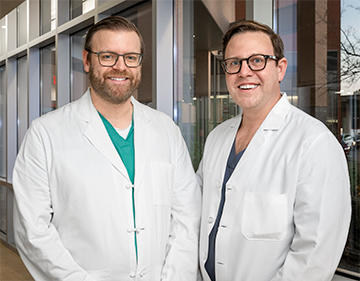Clinton Kemp, MD, and Matthew Summers, MD
Sentara Mid-Atlantic Cardiothoracic Surgeons and Sentara Cardiology Specialists

As of about 10 years ago, the only treatment for aortic stenosis was open-heart surgery. Patients who could not tolerate the operation generally were out of options; they simply got sicker and eventually died of their disease.
The transcatheter aortic valve replacement (TAVR) procedure changed that for many patients, providing a minimally invasive alternative that allows surgeons to access narrowed aortic valves via the femoral artery in most cases.
Still, a subset of high-risk patients remained out of luck: those with aortic insufficiency. Most of these complex patients have little to no calcification around the aortic annulus, which surgeons need to anchor the TAVR device.
Today, two physicians at the Sentara Heart Valve Center are helping to change that – part of their ongoing drive to fill significant treatment gaps for patients with different types of heart disorders.
Clinton Kemp, MD, a cardiothoracic surgeon, and Matthew Summers, MD, an interventional and structural heart cardiologist, are working with a new investigational device called the Trilogy transcatheter heart valve (THV) to expand the pool of TAVR patients. The THV has unique locators that attach to native aortic leaflets for secure anchoring in alignment with native anatomy.
The two physicians, based at Sentara Norfolk General Hospital’s Heart Hospital, are part of the national ALIGN-AR trial, which so far has found the procedure safe and effective.
“It’s proving to be a fantastic option for what has really been an orphaned disease,” Dr. Kemp says. “These patients don’t have the anatomy for conventional TAVR procedures and are just too ill, frail or elderly for open surgery, but now they have early access to what I believe will be a very groundbreaking device.”
While approved in Europe, the Trilogy THV is awaiting clearance from the FDA. Under the clinical trial, however, the Sentara team was able to operate on its first patient in July 2023, the first such procedure in the state of Virginia. They had enrolled five patients by year’s end, with at least three more cases scheduled through February.
Each of the first five patients was experiencing severe symptoms – chest pain, shortness of breath and fatigue – that have eased after treatment. As with traditional TAVR, most were able to go home from the hospital after one night.
“So far, we are very optimistic that this will become an important complement to our other treatment options,” Dr. Summers relates.
Dr. Kemp, who completed his cardiac surgery fellowship at Johns Hopkins University, arrived at Sentara eight years ago. Dr. Summers completed interventional and structural heart cardiology fellowships at the Cleveland Clinic before coming to Norfolk five years ago.
The two physicians, along with their partners, have aimed to be national leaders in TAVR as well as in the placement of mitral valve clips, another advanced minimally invasive repair procedure. Trials are also ongoing on new investigational tricuspid and mitral valve implants for patients who would struggle with current replacement techniques.
“We’re developing options for as many patients as we can, so no one is left behind,” Dr. Summers says. “We don’t want people to have to travel outside Hampton Roads, and we’re also starting to get referrals from outside the area, which, of course, we welcome.”
Another focus area is adults with congenital heart disease, who are increasingly living into their 70s or beyond. Drs. Kemp and Summers have partnered with pediatric cardiology teams at Children’s Hospital of the King’s Daughters to help patients with failing replacement valves, pulmonic regurgitation, pulmonary stenosis and other concerns.
“We’re a very comprehensive valve center, and we’re able to introduce these incredible technologies on a regular basis,” Dr. Kemp says. “We’re really excited about what the future holds for our patients.”

